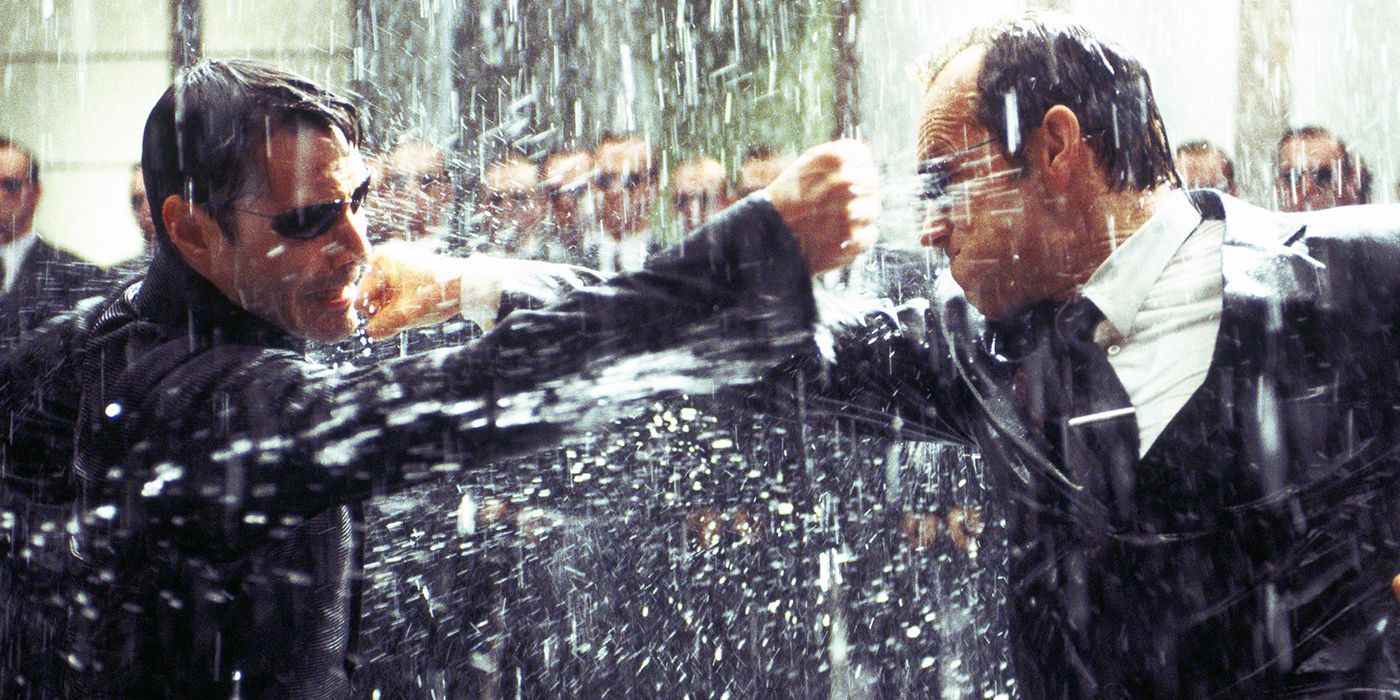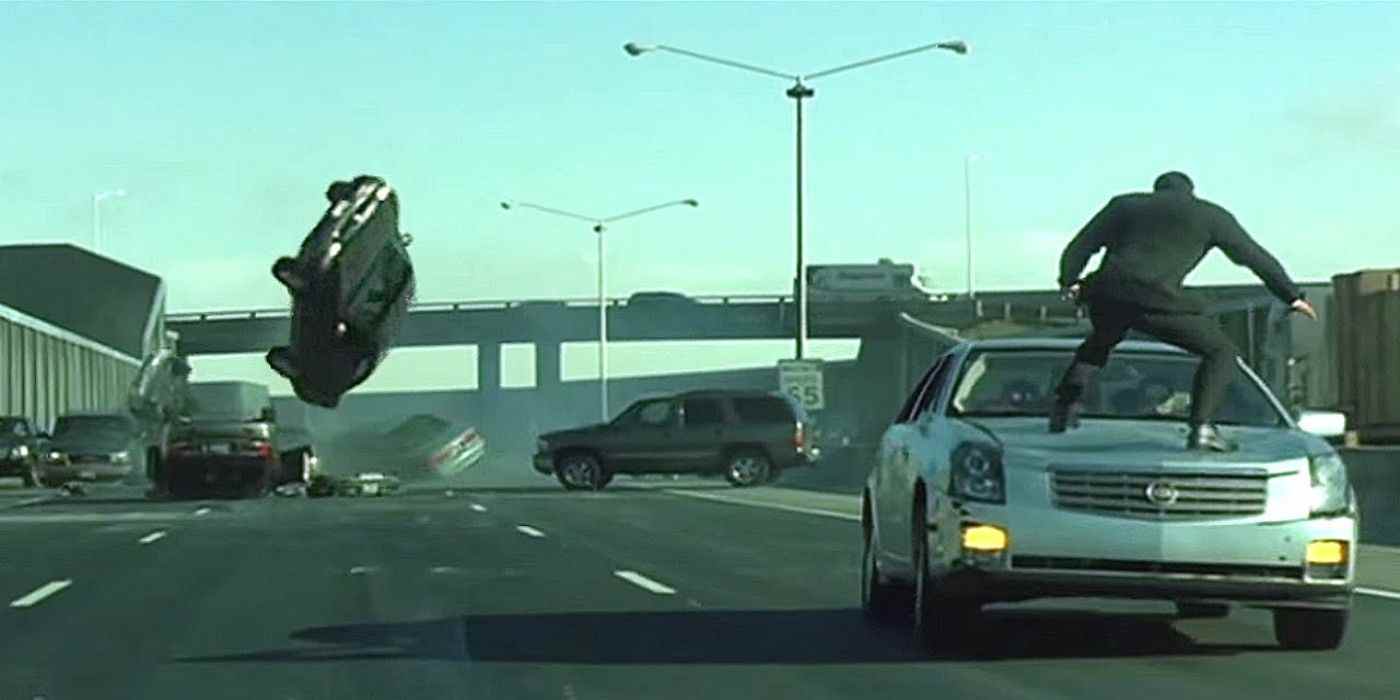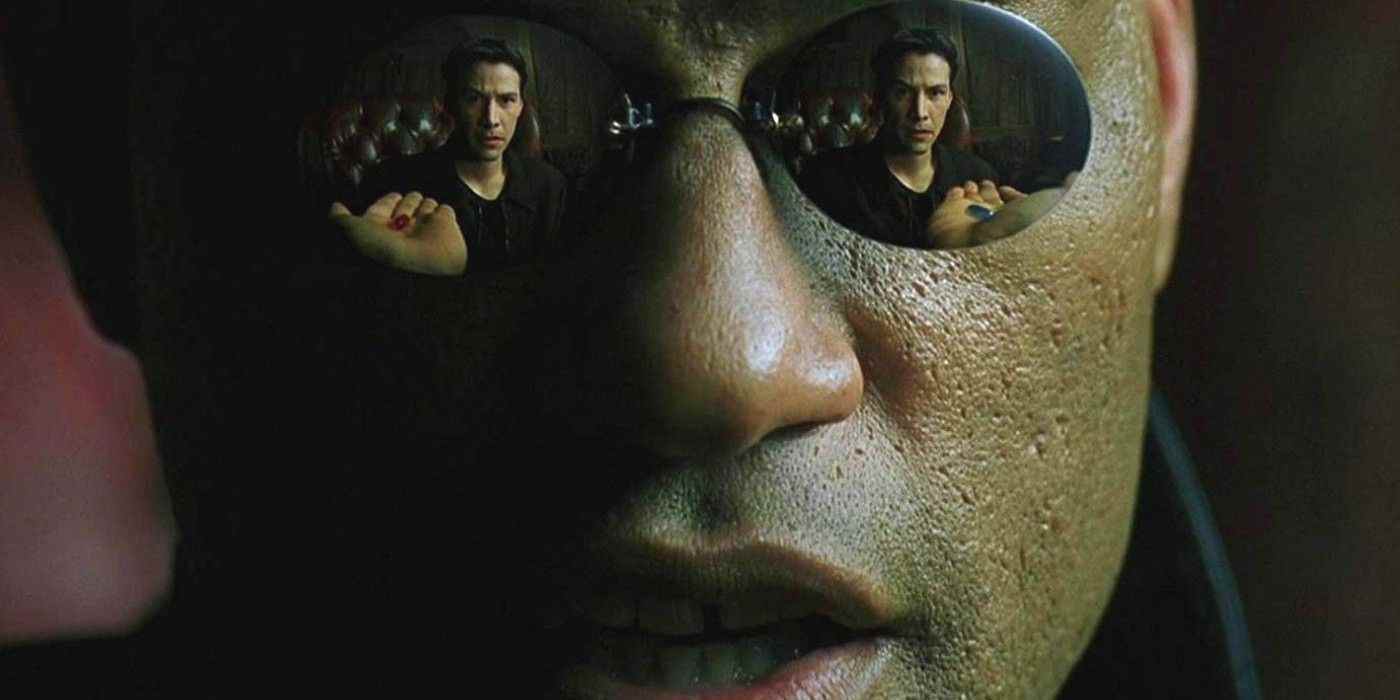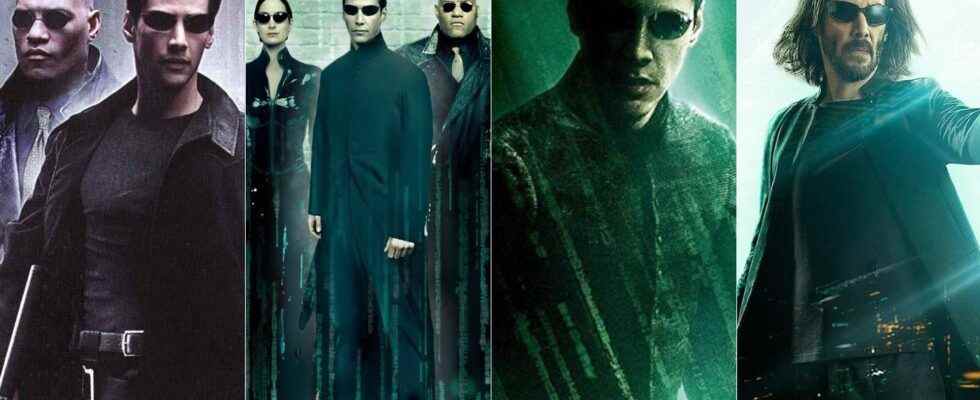How does every movie in The Matrix franchise rank from head-scratching worst to bullet-dodging best? Envisioned by the Wachowski siblings and developed in the late 1990s, The Matrix delivered a pre-millennial dose of existential sci-fi and rapidly became a cultural phenomenon. Based in a dystopian future where war between man and machines ended with AI robots enslaving the human race in a digital simulation (the titular Matrix), 1999’s cinematic classic follows a small band of resistance fighters as they hit back against their well-oiled masters, free others from the virtual prison, and wear some damn cool leather coats in the process. At the eye of the storm is Keanu Reeves’ Neo, who proves to be a figure of prophecy, destined to finally end the war against Zion and liberate mankind.
A pair of sequels followed, both released in 2003, but the Wachowskis’ world also expanded into animation, video games and other media occupying various degrees of canon status. The influence, legacy and popularity of The Matrix remains strong – even 18 years down the line – and talk of a fourth entry was almost non-stop during that entire period. Finally, The Matrix Resurrections arrived in December 2021, bringing back Neo alongside Carrie-Anne Moss’ Trinity, while also adding an array of modern stars such as Yahya Abdul-Mateen II, Jessica Henwick and Neil Patrick Harris. Set decades after Neo’s Machine truce, The Matrix Resurrections simultaneously acts as a sequel, a remake, a reboot, and a commentary, but whatever it is, Matrix fever has started all over again.
Now a fourth movie has entered the Matrix chat, how does each installment of the quadrology rank? Has the passage of time forced a reevaluation of the less-liked films in a similar manner to the Star Wars prequel trilogy? Does the beloved 1999 effort still inspire the same admiration and influence? And does The Matrix Resurrections stand up to its predecessors after so long spent dormant? Here’s our ranking of the movies in The Matrix series, from worst to best.

Upon release, fans widely panned The Matrix Revolutions as one of the most disappointing climaxes in science fiction cinema, and that opinion has barely improved over the intervening years. It could even be said that fan desire to fix the third Matrix movie’s many mistakes was as much a driving force behind The Matrix Resurrections as the prospect of reuniting with the familiar face of Keanu Reeves’ Neo, or the prospect of exploring fresh stories within the Wachowskis’ fictional plane.
Despite suggestions to the contrary, The Matrix Revolutions isn’t an entire disappointment. The finale places greater emphasis on story compared to The Matrix Reloaded, serving up a far meatier plot to chomp on. The Matrix Revolutions rounds off Neo’s deadly feud with Agent Smith in brutal fashion, chronicles the final days of the war against the Machines, unveils the true nature of the Matrix, and justifies Morpheus’ faith in Neo – all points that tarried without much movement in The Matrix Reloaded. But the third film still doesn’t match the storytelling of the original, with Trinity’s death the most obvious sin – a terrible waste of character that neglects to craft any real emotional impact or purpose.
Another positive to draw from The Matrix Revolutions is the ending itself. The trilogy concludes with the Matrix rebooted, Neo ending the Machine war via heroic sacrifice, and humanity presented with hope for a brighter future (temporarily, as it turns out). Audiences are afforded the closure of a happy ending, but not without a touch of bitter mortality. That’s exactly the place The Matrix trilogy needed to finish in 2003. Unfortunately, that’s not enough to keep Revolutions from bottom spot on this Matrix movie ranking.
The route The Matrix Revolutions takes to reach said finale leaves movie-goers desperately reaching for the blue pill. The end of Neo’s story is a meandering, frustrating quest for answers that fails to emulate the philosophical intrigue of 1999, coming off as pretentious, ambiguous and evasive rather than clever, curious and considered. As The Matrix Revolutions struggles to tie together its real-world Machine storyline and the threat of Agent Smith, it becomes clear that The Matrix Reloaded and The Matrix Revolutions perhaps should’ve been condensed into a single streamlined film that combined the best elements of both.

Measuring The Matrix Resurrections against the original trilogy is like comparing Christmas as an adult to Christmas as a child – you get the same decorations, do the same traditions, follow the same routine… and even though nothing feels like it once did, that’s also sort of the point…?
The Matrix Resurrections has plenty going for it. The technology of 2021 has brought a distinct visual sheen that blends the original trilogy’s aesthetic (minus the sequels’ green hue, thankfully) with the sleekness of modern blockbusters. Whether it’s the sunsets of San Francisco, or the post-apocalyptic metal of a thriving Machine City, the scenery has an updated pop without losing the core of what a Matrix movie should look like, which makes the duality between real and simulation even stronger. Additionally, The Matrix Resurrections serves its characters far better than The Matrix Revolutions. Trinity finally receives the closure she should have found in 2003, while focusing on she and Neo’s love – rather than typical end-of-the-world shtick – makes for a more personal conclusion.
The newbies fit in seamlessly too. Jessica Henwick, Neil Patrick Harris and Jonathan Groff are all inspired additions, while Yahya Abdul Mateen II does admirably given the impossible task of following Laurence Fishburne as Morpheus. For a sequel so heavy on nostalgia (and painfully aware of that fact), The Matrix Resurrections could actually show the Star Wars sequel trilogy a thing or two about assimilating new characters alongside beloved returnees. Predictably, The Matrix Resurrections is tuned to a distinctly meta key, and that self-awareness allows the long-awaited 2021 sequel to be self-referential without descending into fan service or disappearing up its own backside. Not since 1999’s original The Matrix has the franchise combined action sci-fi with thought-provoking themes so well.
But it’s also that meta through-line that drags The Matrix Resurrections down. Lana Wachowski tries valiantly to justify why the story is continuing, and why The Matrix Resurrections is essentially a retread of 1999, but the task is too great. Though largely fine as an epilogue, at no point does Neo and Trinity’s return feel essential or natural, leaving The Matrix Resurrections ringing hollow – not necessarily in terms of character (one of the sequel’s strengths), but certainly in the action stakes and overall concept.
In the opening 20 minutes, Jonathan Groff’s character utters, “Our beloved parent company Warner Brothers has decided to make a sequel… they informed me they’re going to do it with or without us.” Intentionally or otherwise, this can’t help but feel like Lana Wachowski telling audiences how much she doesn’t want to be making The Matrix Resurrections, and that cynicism hangs over the entire movie. Had Wachowski committed to making either an edgy meta movie business allegory or a genuine continuation from the original trilogy, her new entry might sit higher on this Matrix movie ranking, but by being less… binary… in concept, there’s a tonal clash.

2003’s Matrix sequels aren’t fondly remembered, but while it’s tempting to lump the pair together into one disappointing bundle, The Matrix Revolutions bears more responsibility than The Matrix Reloaded for the series’ decline.
Perhaps the most damning indictment of The Matrix Reloaded, the middle installment of the trilogy, is how the entire film can be removed and the overall narrative barely changes. The Wachowskis’ first sequel doesn’t do enough to advance the original Matrix story to justify an entire film, and instead plays more like a procession of action sequences loosely linked by barely-concealed exposition. While the cast, crew and spirit all remain consistent with the first Matrix offering, Reloaded employs an entirely different ethos, replacing smart subtlety and interesting metaphor with obvious and literal parallels. This more straightforward approach lifts the aura of mystery The Matrix built, but fails to put anything of substance underneath… apart from that awful rave sequence.
Despite its shortcomings, The Matrix Reloaded isn’t entirely without merit, and succeeds on two fronts: expanding the fictional universe and visually stunning action. While the plot itself might be largely inconsequential, the second Matrix movie enrich the in-universe dystopia and introduces aspects that remain part of the wider universe even in The Matrix Resurrections. The Merovingian’s influence comes to the fore and his admittedly awesome twin henchmen debut. Viewers learn more about the formation and hierarchy of the Matrix, and Agent Smith evolves into a rogue program. These are all great additions that broaden the Wachowskis’ mythology – albeit ones that could be considered detours more than necessary progression.
In terms of action, the Keymaker highway battle is without question the most memorable chapter of the Wachowskis’ awkward middle child. Indeed, the sequel’s fight sequences represent a rare step-up compared to the original Matrix movie, proving even more fun, innovative and artistically intense. And therein lies the problem with The Matrix Reloaded; where the 1999 film inventively blended philosophical themes, mind-bending science fiction and aesthetically grandiose action, the follow-up’s focus lies squarely on heart-pounding adrenaline moments. The trigger-happy “Reloaded” tagline perhaps should’ve acted as early warning that The Matrix‘s sequel wouldn’t meet cerebral expectations.
Nevertheless, The Matrix Reloaded holds several edges over Resurrections in the Matrix movie ranking. Though nearly 20 years senior, The Matrix Reloaded‘s action remains a league above Lana Wachowski’s 2021 sequel, and represents a more natural, progressive continuation of Neo and Trinity’s journey, despite its flaws. Indeed, The Matrix Resurrections arguably highlights the pros of The Matrix Reloaded more than ever. Both sequels were assigned the task of continuing a narrative many held dear, and both approached the challenge with vastly different philosophies. Though the existing drawbacks haven’t disappeared, 2021’s developments make it easier to appreciate what The Matrix‘s first sequel brought to the table.

The 1999 The Matrix movie is quite simply levels above the others in the series. Movie sequels are often judged unfairly, with fans so attached to the original, they struggle accepting any expansion of their beloved franchise. In the case of The Matrix, however, there exists a clear and tangible gulf in quality between the first release and its successors.
Visually, The Matrix was a revolutionary undertaking from the Wachowskis. The creation of a dual setting – one familiar to viewers but malleable and fake, and one futuristic but completely fabricated – was unlike anything movie-goers had seen before and felt utterly immersive, even with pre-2000 special effects. The Matrix also helped pioneer new trends such as bullet time and gun-fu, as the action sequences seamlessly melded martial arts, firearms and futuristic technology. This approach wasn’t just fresh, it also perfectly represented the zeitgeist of the day – the fears and hopes of the western world heading into the year 2000.
But with the visuals and action sequences consistently stunning across all Matrix movies, what elevates the first film above the pack? Appropriately, given the themes at play, The Matrix‘s true strength lies in its near-perfect balance. As much as The Matrix is a landmark action movie, the film also incorporates cerebral science fiction in the style of Blade Runner, and can either be enjoyed as a mindless fists-and-firefights flick or endlessly analyzed and dissected as a dystopian think-piece. Such balance is lost in the sequels, with The Matrix Reloaded falling too far into action territory, Revolutions losing itself in an attempt to be intelligent, and Ressurections caught between meta reality and the simulated fictional battle. The Matrix manages to tread the fine line between intriguing audiences and frustrating them with ambiguity.
It’s difficult to imagine The Matrix Resurrections happening at all if the original hadn’t left such a strong and enduring legacy, overcoming the potential damage 2 less-than-impressive sequels inflicted. The benefit of hindsight might have improved fan sentiment towards Revolutions and Reloaded ever so slightly, but the original The Matrix still reigns supreme.
The Matrix Resurrections Credits Scene Explained: Do They Think It’s Funny?
